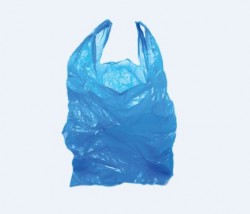News | April 25th, 2016

In recent years environmentalism has come closer to the forefront of political and social discussion. Ever since science has become more vocal about humanity’s effect on the natural world there has been passionate discussion about the subject running the gamut from what needs to be done to accusing environmentalism of being an ideological ploy. In any case there will be a lot of change and a lot of risk no matter what is done.
No discussion of mankind’s effect on the environment would be complete without bringing up that miracle material known as plastic. Made out of extruded oil, it is almost universally used because of its cheapness and ability to be molded into all kinds of shapes. But with those benefits come drawbacks, such as continuing our independence on oil and taking decades, if not centuries, to degrade, and even after that leaving microscopic particles of the material that can affect the local wildlife and environment (just look at the Pacific Garbage Patch).
It’s these kind of considerations that influenced Minneapolis’ recent decision to ban plastic bags from its grocery stores, one of the latest in a chain of these sort of decisions in locations like San Francisco and the entire state of Hawaii. The movement to do so went off surprisingly without a hitch, with the majority of people deciding to support it.
The ban sees the end of plastic shopping bags at the checkout counters, only keeping plastic wrapping around for things like containing produce and meat. Shoppers will be charged five cents each for paper bags and the city is backing an initiative to make sure that everyone has reusable bags to bring grocery shopping.
Is that sort of change on the horizon in Fargo’s future? City Commissioner Mike Williams thinks it could be. Having been re-elected to his position three times since 2004, in 2005 Williams spearheaded the formation of the Renewable Energy and Conservation Committee in Fargo. He was also a former board member and president for the North Dakota Alliance for Renewable Energy from 2003 to 2010. Under his leadership, several sponsors for renewable energy were found and now there is a renewable energy commission at the state level that provides grants to projects like the Cass County Electrics Prairie Solar Garden.
In 2007, the City of Fargo along with Gate City Bank, the NDSU Ag Department, and the North Dakota Alliance for Renewable Energy began a reusable bag campaign, with the bags being handed out at any Gate City Bank and bags with built-in snaps being sold at Hornbacher’s for $1 each. “I have at least twenty of them,” Williams says, many of them made from, of all things, recycled plastic, but much more durable than their usual counterparts.
He mentions that in order to get the sort of law in place that Minneapolis has enacted, the city commission would have to work hand-in-hand with the local grocery stores. He remains hopeful about this, especially since the Earth Day Network, the founders of the holiday, voted Fargo the best in country for environmental friendliness in 2007. In fact, ever since the initiative to provide reusable bags, less and less plastic has been finding its way into our landfills.
Williams mentions another possibility in Fargo’s environmental future. “For the past nine months we’ve been studying the pros and cons of single sort recycling.” Single sort recycling means that those who choose to recycle could put all of their recyclables, regardless of material, in the same container and that the material would be sorted out later at the redemption center. “We see an increase in the amount recycled when people don’t sort it themselves due to the convenience, but a larger part of the recycled material is unable to be repurposed due to cross-contamination.” This contaminated material, since it isn’t pure enough to be recycled, unfortunately ends up in the landfill, the whole thing that recycling is meant to avoid. Even though many find it less convenient to sort their recyclables themselves, Williams points out, “Doing the best thing for the environment isn’t always the most convenient.” Despite these potential drawbacks, Williams says that single-sort recycling will likely be put in place in Fargo this year or next.
So if you want to help Fargo move in a cleaner, greener direction, be sure to pick up some reusable bags. You know how the phrase goes, “Reduce, reuse, and recycle.” If we keep this sort of thing up, we may have a future in Fargo that’s free of bags being blown in the wind.
February 16th 2026
January 27th 2026
January 27th 2026
January 26th 2026
January 24th 2026



_(1)__293px-wide.jpg)

_(1)__293px-wide.png)